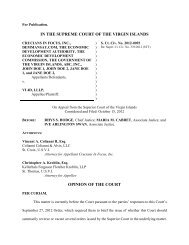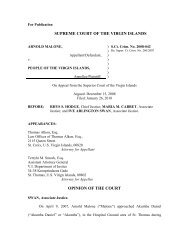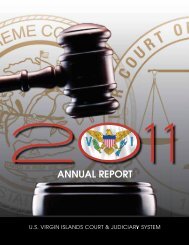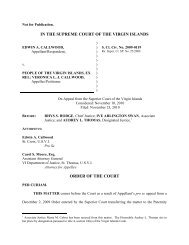Watts v. Two Plus TwoS. Ct. Civ. No. 2007-0127Opinion of the CourtPage 8 of 10motion or at the September 18, 2007 hearing that any witnesses had actually become unavailableor had forgotten about the incident. Moreover, notwithstanding the fact that a defendant does notpossess an affirmative duty to ensure that a plaintiff prosecutes his case, the Superior Courtshould have considered—in the context of determining the extent of the prejudice—that TwoPlus Two did not request Watts’s initial Fed. R. Civ. P. 26 disclosures until May 5, 2007, did notfollow-up on its July 25, 2003 demand for documents until May 5, 2007, and did not attendBell’s November 16, 2006 deposition even though it had received notice. Under thesecircumstances, as well as the absence of any evidence in the record indicating that Two Plus Twowas actually prejudiced, the Superior Court lacked a factual basis to find that the prejudice toTwo Plus Two had been “substantial.” Therefore, while the second Halliday factor does supportdismissal because of the inherent prejudice Two Plus Two suffered as a result of the delay, itdoes so only slightly.Likewise, we find that while the Superior Court correctly held that the third Hallidayfactor—Watt’s history of dilatoriness—favors dismissal, 2it failed to properly weigh theimportance of that factor in light of the facts of the case. Although the record clearly indicatesthat Watts’s counsel failed to respond to the July 25, 2003 demand for documents or complywith the May 7, 2007 scheduling and mediation orders, it also established that Wattsimmediately complied with the Superior Court’s October 26, 2006 Order by scheduling Bell’s2 Although Watts argues that the trial court erred because it “failed to acknowledge Appellant’s counsel (sic)assertion that he had never received the Court’s scheduling order; even after counsel pointed out to the Court thatorders had not been received in several other pending matters, including orders from other chambers of the Court,”(Appellant’s Br. at 7-8), the record clearly indicates that the Superior Court’s orders were all sent to Watts’s counsel.(J.A. at 72; Supp. App. at 9.) Additionally, even if Watts’s counsel had not received a copy of the scheduling order,this order is expressly referenced in Two Plus Two’s May 5, 2007 letter, which had been sent to Watts’s counselthrough both mail and fax. (J.A. at 79.) Furthermore, while Watts’s counsel was aware that little or no action hadtaken place with respect to this matter for several years, the record does not reflect that he made any attempt tocheck the docket or follow-up with the trial court as to the case’s status. See Hobbs v. Wal-Mart Stores, Inc., No.CV-06-1031-PHX-PGR, 2007 WL 4510518, at *3 (D. Ariz. 2007) (observing that there is “no excuse” for anattorney or his staff not to check the docket to see if a scheduling order has been issued in a pending case).
Watts v. Two Plus TwoS. Ct. Civ. No. 2007-0127Opinion of the CourtPage 9 of 10deposition, a fact which is not referenced in the Superior Court’s October 19, 2007 Order. Thus,although Watts’s counsel “engaged in a pattern of dilatory conduct” that favors dismissal, theSuperior Court placed greater weight on this factor than it should have, given Watts’s priorcompliance with its orders.Finally, we agree with Watts that the Superior Court erred when it found that Watts’scounsel’s “conduct throughout this litigation compels a finding of willful and bad faith conduct”and that “lesser sanctions would engender further delay, and would be in effect no less harshthan dismissal.” (J.A. at 8.) With respect to the bad faith factor, the October 19, 2007 Orderfails to cite to any particular evidence in the record that that would support a finding that Watts’scounsel acted in bad faith. Moreover, while the Superior Court found that Watts’s counsel “ineffect willfully abandoned his case by failing to pursue litigation over a period of four years,”(J.A. at 8), this finding is clearly erroneous given that the record clearly indicates that Watts’scounsel had deposed Bell on November 16, 2006. Similarly, while the Superior Court states thatit “is cognizant that dismissal must be a sanction of last, not first, resort,” (J.A. at 8), the October19, 2007 Order simply states that “imposition of lesser sanctions would be ineffective” withouteven identifying any lesser sanctions that were considered, let alone explaining why those lessersanctions could not have been imposed. (J.A. at 9). Accordingly, neither of these factors weighin favor of dismissing Watts’s action for failure to prosecute.Here, only two of the six Halliday factors favor dismissal at all, and—given Two PlusTwo’s failure to identify any prejudice other than inherent prejudice, as well as Watts’s counsel’scompliance with the October 26, 2006 Order—those factors only slightly support dismissal.Therefore, because the Superior Court could not have properly concluded that “these six factorsstrongly weigh in favor of dismissal as a sanction,” Halliday, 2010 WL 1576436, at *3, we hold
- Page 1 and 2: For Publication.IN THE SUPREME COUR
- Page 3 and 4: Watts v. Two Plus TwoS. Ct. Civ. No
- Page 5 and 6: Watts v. Two Plus TwoS. Ct. Civ. No
- Page 7: Watts v. Two Plus TwoS. Ct. Civ. No
- Page 11 and 12: SWAN, Associate Justice, concurring
- Page 13 and 14: Watts v. Two Plus Two, Inc.S.Ct. Ci
- Page 15 and 16: Watts v. Two Plus Two, Inc.S.Ct. Ci
- Page 17 and 18: Watts v. Two Plus Two, Inc.S.Ct. Ci
- Page 19 and 20: Watts v. Two Plus Two, Inc.S.Ct. Ci
- Page 21 and 22: Watts v. Two Plus Two, Inc.S.Ct. Ci
- Page 23 and 24: Watts v. Two Plus Two, Inc.S.Ct. Ci
- Page 25 and 26: Watts v. Two Plus Two, Inc.S.Ct. Ci
- Page 27 and 28: Watts v. Two Plus Two, Inc.S.Ct. Ci
- Page 29 and 30: Watts v. Two Plus Two, Inc.S.Ct. Ci
- Page 31 and 32: Watts v. Two Plus Two, Inc.S.Ct. Ci
- Page 33: Watts v. Two Plus Two, Inc.S.Ct. Ci
















